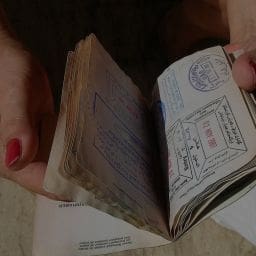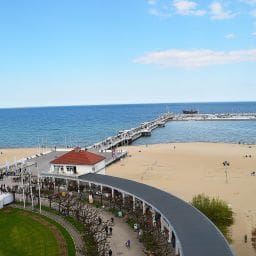Poland – Traditions & Customs 🇵🇱✨
🎄 Christmas: A 12-Dish Spectacular
Forget turkey and stuffing — Polish Christmas Eve (Wigilia) is a full-blown culinary marathon. The big event happens on 24 December, when families gather to eat 12 different dishes. Yes, twelve. Each one symbolises a month of the year and must be sampled (no skipping allowed!). Meat? Not today, Satan. It’s a meat-free affair, featuring pierogi, beetroot soup (barszcz), herring in oil, and mysterious mushroom-based concoctions that your Polish friends will insist you love.
- 🥟 You start with the sharing of the opłatek – a paper-thin wafer with a side of awkward well-wishing.
- 🎁 Gifts only come after dinner. Yes, you have to earn them.
- 🐟 If there’s a carp swimming in your bathtub, don’t ask. It’s for dinner. Eventually.
💍 Weddings: Vodka, Dancing, Repeat
A Polish wedding is not an event. It’s an endurance test. You’ll eat your body weight in food, down enough vodka to sterilise a hospital, and dance until your shoes fall apart. Most weddings last two full days. By the end, you won’t remember the names of the bride or groom, but you will have memorised the lyrics to “Sto Lat” and developed an addiction to pickled cucumbers.
- 🥂 You’ll be toasted approximately every 7 minutes. Pace yourself.
- 💃 The dancing is wild, joyous, and not always coordinated.
- 🕊️ There may be doves, fireworks, or an accordionist named Zbyszek. Just go with it.
🌾 Dożynki: The Harvest Festival You Didn’t Know You Needed
Every August or September, villages across Poland celebrate the end of the harvest with Dożynki, a festival full of folk music, flower crowns, traditional costumes, and enough bread to open a bakery. There are processions, prayers, and – naturally – more vodka. Think of it as Glastonbury, but with more wheat and less mud.
👒 Top tip: If someone hands you a crown made of rye, wear it with pride. You are now royalty. Kind of.
👼 Name Days Are A Bigger Deal Than Birthdays
In Poland, your birthday is fine – but your name day (imieniny)? That’s the real party. Every name is assigned to a specific day in the calendar, and if it’s your turn, you’re expected to bring cake to the office. Or vodka. Or both. People will wish you well even if you barely know them. It’s like Facebook remembered your birthday… but in real life.
- 📅 Don’t know your name day? Ask a babcia. She’ll know.
- 🎂 Expect gifts, flowers, and awkward singing.
- 🍾 If your name is Jan or Anna, you’ll be busy. There are dozens of you.
🕯️ All Saints’ Day: A Beautiful, Candlelit Silence
On 1 November, Poland transforms. Cemeteries glow with thousands of candles, as families visit the graves of their loved ones to pay their respects. It’s peaceful, moving, and surprisingly photogenic. Don’t expect parties – this is a day for reflection, remembrance, and possibly getting lost in the dark while trying to find Grandma Zofia’s grave.
🕯️ Top tip: Bring flowers, a lighter, and tissues. Lots of tissues.
🥚 Easter: Bless the Basket, Avoid the Water
Easter in Poland comes with its own customs, starting with the święconka — the blessing of the Easter basket. You’ll fill it with eggs, sausage, salt, bread, and cake, then trot off to church for it to be sprinkled with holy water. Lovely, right? Yes — until the next day: Śmigus-Dyngus (Wet Monday), when everyone chases each other with buckets of water. Children, teenagers, grandparents… no one is safe.
- 🥚 The basket must be Instagram-worthy. Presentation is everything.
- 💦 Avoid teenagers with water guns at all costs.
- 🐣 Expect random strangers to say “Wesołego Alleluja!” with alarming enthusiasm.
🎭 Fat Thursday: Eat Until You Regret Everything
Known as Tłusty Czwartek, this glorious day involves eating as many doughnuts (pączki) as your body can handle. It’s a pre-Lenten excuse to give up on dignity and inhale deep-fried pastries stuffed with rose jam. People queue outside bakeries from dawn. If you turn up doughnut-less to work, you may be quietly judged by your colleagues.
🍩 Top tip: One doughnut is polite. Three is normal. Five means you’re ready for Polish citizenship.
🍻 Cheers to Polish Hospitality
Poles are famously hospitable. If you’re invited into a Polish home, expect to be fed until you physically can’t move. Refusing food is not an option — and saying “I’m full” is simply seen as a challenge. Your glass will never be empty, your plate will never be bare, and you’ll probably leave with a bag of leftover meat and a jar of pickles.
- 🥒 Always say yes to the pickles. Always.
- 🍰 There is always room for cake, even after four courses.
- 🥂 If vodka is poured, toast with “Na zdrowie!” and make eye contact.
🇵🇱 Final Thoughts
Polish traditions are a beautiful mix of reverence, resilience, and a healthy dash of vodka. They reflect the heart of the country — strong, proud, welcoming, and ever so slightly eccentric. Whether you’re watching fireworks at a wedding or getting soaked on Wet Monday, you’re part of something ancient, joyful, and wonderfully Polish.
Also read: A British Immigrant’s Guide to the Wonderfully Weird World of Polish Living
















